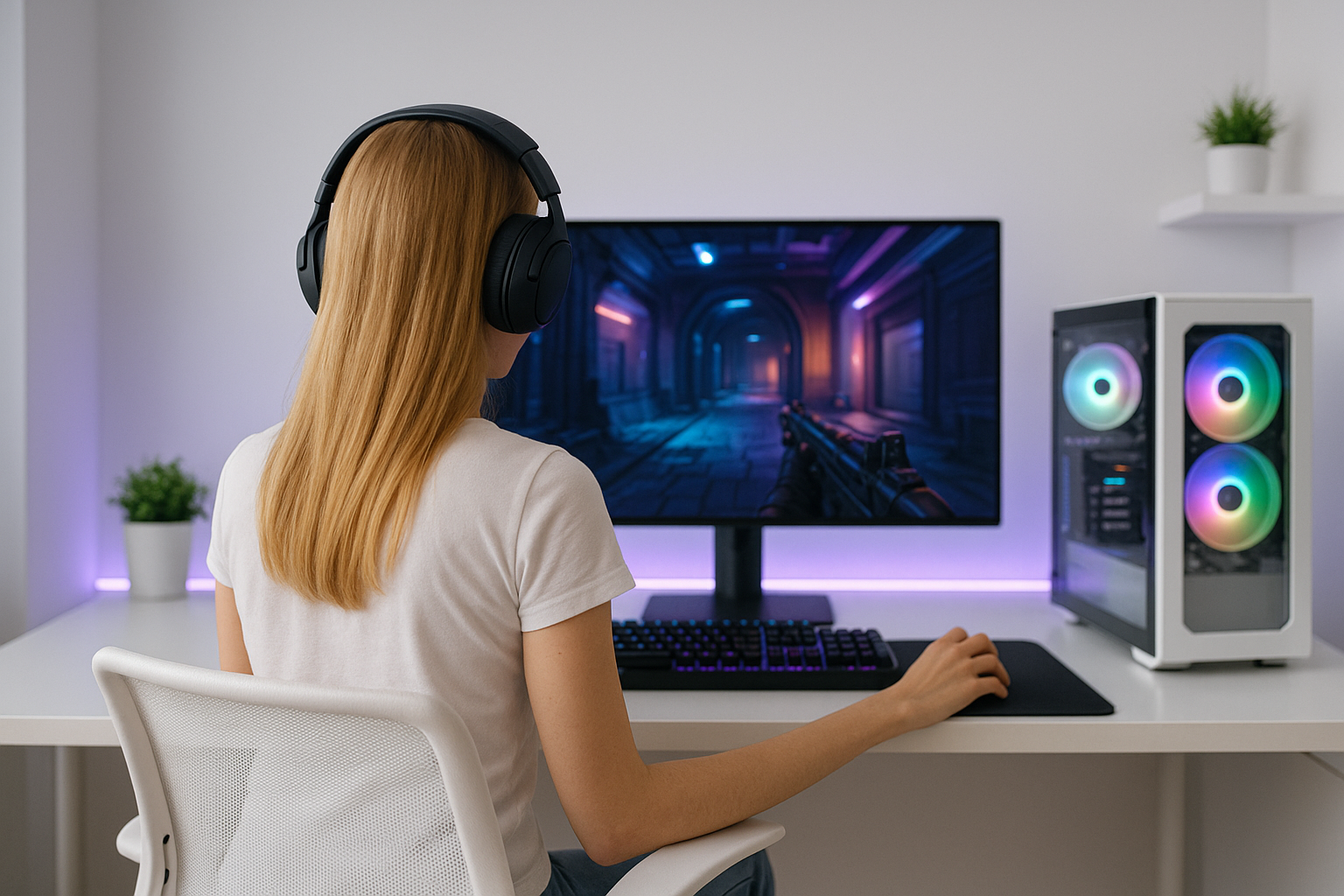Specifications Table
| Specification | Detail |
|---|---|
| Product | Gaming Monitor |
| Model | VG27WQ3B |
| Brand | ASUS |
| Display Size | 27 inch |
| Resolution | 2560 x 1440 |
| Refresh Rate | 180Hz |
| Response Time | 0.5ms |
| Color Gamut | 90% DCI-P3 |
| Curvature | 1500R. |
| Rating | 4.6 / 5 ⭐ (+2680 ratings) |
| Price | 180 $ (approx) 🏷️ |
Main Features
🖥️ Immersive Curve: gentle 1500R radius cradles your vision
🎮 High Refresh Rate: 180Hz keeps fast action fluid
⚡ Fast Response: 0.5ms GTG minimizes blur
🌈 Wide Gamut: covers 90% DCI-P3 for rich colors
🔄 FreeSync Support: synchronizes frames for tear-free play.
Pros and Cons
👍 Immersive Field: Curved display pulls you deeper into gameplay
👍 Fluid Performance: High refresh rate and low response feel smooth
👍 Vibrant Colors: Accurate hues bring visuals to life.
👎 No Speakers: lacks built-in audio forcing external solutions
👎 Stand Wobble: base can feel a bit shaky during adjustments
👎 HDR Limits: basic HDR support not as brilliant as high-end panels.
ASUS VG27WQ3B Opinions
Many players praise the wraparound view and silky-smooth performance, noting that it elevates high-speed races and shooters. Others mention the lack of integrated speakers and simple HDR as minor trade-offs. Overall, opinions cluster around its strong gaming focus with a few ergonomic quirks.
Overall rating

When I unboxed the VG27WQ3B, the first thing that caught my eye was its matte black bezel and sturdy packaging. The slight curvature felt intriguing, making me curious how it would reshape my daily routine. After plugging into my PC and firing up a cinematic trailer, I found myself leaning forward, drawn in by the subtle wraparound effect and the surprisingly deep blacks. It felt like upgrading from a regular TV to a mini theater screen right on my desk.
Lowering my chair and finding the sweet spot took only seconds thanks to the tilt range. The stand’s arm glided smoothly, although I noticed a gentle wobble if I nudged the desk during intense gameplay. I didn’t have to wrestle with menus, because the DisplayWidget software let me tweak brightness and color modes with a few clicks. Even the cable management clip on the back kept my desk clutter-free and the sleek black finish blended seamlessly with my surrounding RGB lights.
Under direct sunlight streaming through my office window, the matte surface curbed annoying reflections while preserving vivid hues. Nighttime gaming sessions revealed a surprising contrast ratio, where shadowy dungeon corridors held detail instead of fading into murk. I tested vibrant racing titles and noticed how bright reds and deep blues maintained their saturation without looking oversaturated. The 1500R curvature made scanning across the track feel smooth, guiding my eyes naturally from model to model without abrupt screen edges.
As a freelance 3D artist who often hops between client presentations and evening co-op raids, this monitor has become my daily companion. Software like Blender and my favorite FPS titles felt equally at home on its surface. With 180Hz active, tracking moving enemies became second nature and rendering previews popped with clarity. During a group stream over Skype, I could keep my chat window open on one side and the game on the other without the image feeling cramped or distorted.
I plugged in both my PC tower and laptop via the HDMI port and used DisplayPort for the console, switching sources through the quick menu with no hiccups. Although there’s no built-in speaker bar, the dedicated headphone jack kept audio close at hand when I wanted stealth whale calls in my MMO. The low blue light mode on late-night editing tasks spared my eyes fatigue, and FreeSync compatibility meant I never saw tearing across different devices.
Compared to my old Dell S2719DGF, the ASUS’s curve created a more immersive shell around my vision yet traded a slight loss in viewing angle extremes. Where the Dell’s HDR shone brighter, this model kept its cost and framerate advantage. I noticed faster response times here, but some colors didn’t pop as intensely as on an LG UltraGear. Still, I valued the smoother high-FPS streak and the built-in shadow boost that clarified dark corners during stealth missions.
After several weeks of gaming marathons, design work and routine office tasks, I appreciate this monitor’s strengths without ignoring its quirks. It excels at making fast scenes feel seamless and deep images feel engaging, yet falls short on audio and peak HDR brilliance. If you prioritize motion clarity and want an affordable curved QHD screen, it’s a compelling choice. For anyone seeking audio depth or perfect HDR finesse, pairing it with dedicated speakers or a brighter display may be necessary to round out the setup.




